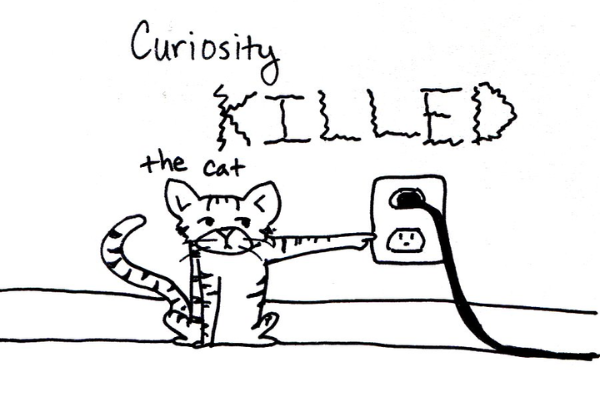
Curiosity Killed the Cat - And It Came Back
- Category: Gospel Truth
- Date 07-01-2018
- 1338 views
I wanted to understand the gist of the proverb, “Curiosity killed the cat”, and I went about searching various sources. I have learnt that this proverb is used to warn people about the problems which a person can get if he or she tries to take interest in matters which seem to be beyond the ‘limits’. Some people tell others, “Mind your business.” In recent years, a Ugandan soldier said, “Leave the issues of generals to the generals.” Another politician has told religious leaders, “Do not meddle in politics.” In a sense, students should not care about the activities of teachers; men should disregard women’s affairs; engineers should not mind about lawyers; rural dwellers should not discuss town matters; traders should not care about farmers; and etcetera.
On the other hand, my curiosity led me to discover that the proverb has also provoked an answer, “satisfaction brought the cat back.” Taken together, it becomes, “Curiosity killed the cat but satisfaction brought it back.” Recently, I posted the whole statement on my timeline and someone replied, “Did the cat resurrect?” Then my response was, “Did the cat die, in the first place?”
In my view, the cat which was not curious is the one which imagined that the curious one had died. The fearful cat behaved like King David, who relegated the ark of God to the house of Obed-Edom the Gittite. With some 30,000 able young men, David placed the ark in a new cart, pulled by oxen, as they transferred it from Baalah to Jerusalem. Along the way, the oxen stumbled and a vigilant person, Uzzah, tried to prevent it the ark from falling. When Uzzah touched the ark of God, he died instantly (2 Samuel 6:1-6).
David must have thought, “Curiosity killed the cat!” because touching the ark was a sign of disrespect of God. He also feared to have the ark close to him, so he took it to the house of Obed-Edom. After three months, he found out that the host was not in trouble at all; instead the Lord blessed Obed-Edom and his entire household. Thus David decided to relocate the ark of God from the house of Obed-Edom to the City of David, amidst great celebration (2 Samuel 6:9-15).
Curiosity arises from a person’s motivation to go beyond simple considerations in order to reach a superior level. It is the reason children go to school; intellectuals carry out research; and inventors venture into unfamiliar arenas. They are all anxious to see what they have never seen; to discover what is unknown; and to improve what already exists. This perhaps explains why the proverb has been wrapped up thus, “Satisfaction brought the cat back to life.” People who believe in “curiosity killed the cat” think it is dangerous to venture whereas promoters of “satisfaction brought the cat back” consider that it is empowering to venture.
Near Bethlehem, the shepherds were told by the Angels that the Lord, Jesus Christ, had been born. For such rustic folks, this was a puzzling announcement. They possibly would have scampered back home. Instead, they became curious and anxious to know what was happening, “When the angels went away from them back into heaven, the shepherds said to one another, ‘Let’s go to Bethlehem and see this thing that has happened…. So they hurried off and found Mary and Joseph and saw the baby lying in the manger….” (Luke 2:8-20). As a result of their curiosity, the shepherds got the earliest opportunity to meet the Holy Family. In a similar way, the wise men saw a star, which signalled the birth of Jesus. They also cared about the essence of such an unexpected occurrence, so they pursued it: “Soon afterwards, some men who studied the stars came from the east to Jerusalem and asked, ‘Where is the baby born to be the king of the Jews? We saw his star when it came up in the east and we have come to worship him’ (Matthew 2:1-2).
On Mt Sinai, Moses saw that the bush was on fire but that it was not burning up. He should have run away in order to be safe from such an abnormal incident. On the contrary, he became curious and decided get nearer as he thought, “This is strange… why isn’t the bush burning up? I will go closer and see” (Exodus 3:2-3). In so doing, Moses met God and left greatly transformed and empowered. When Samuel served the Lord as an apprentice, supervised by Eli the, visions were quite rare. However, Samuel was not terrified when called by God; rather he tried to find out the truth, “One night Eli… was sleeping in his own room. Samuel was sleeping in the sanctuary where the sacred covenant box was…… the Lord called Samuel, he answered, ‘Yes sir’ and ran to Eli….” (1 Samuel 3:1-9). It was then that he was guided on how to respond to God.
People reacted rather curiously when John the Baptist began his ministry. As a prophet, he too was surprised by the way the public responded to his message, “People came to him from Jerusalem….. Judea….. Jordan…. When he saw several Pharisees and Sadducees… he said to them, ‘You brood of vipers! Who warned you to flee from the coming wrath? (Matthew 3:7). John the Baptist rose to the occasion and baptised so many. When Jesus had risen from the dead, two curious disciples were able to confirm the resurrection. Magdalene said to Peter and John, “They have taken the Lord from the tomb…. Then Peter and the other disciple went to the tomb… running….” (John 20:1-8). And they confirmed the resurrection - out of curiosity.
Venansio Ahabwe is a lay Christian from the Archdiocese of Mbarara
By Venansio Ahabwe
Source: Gospel Truth, Leadership Magazine
